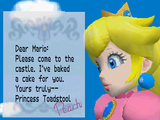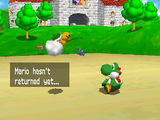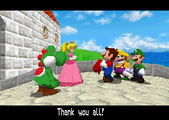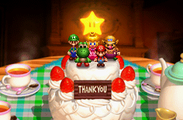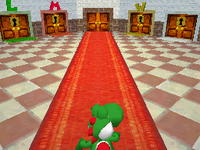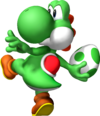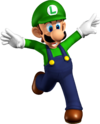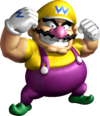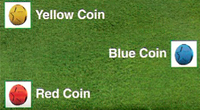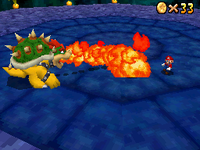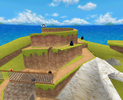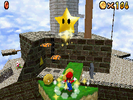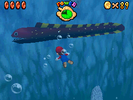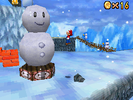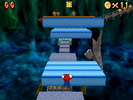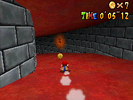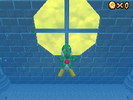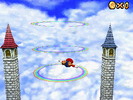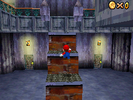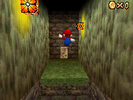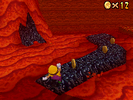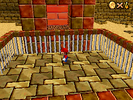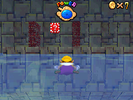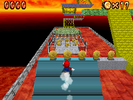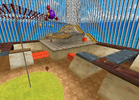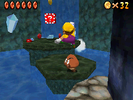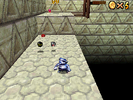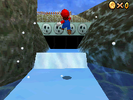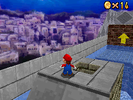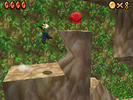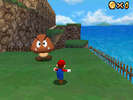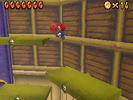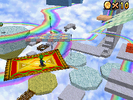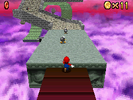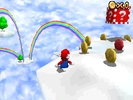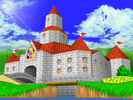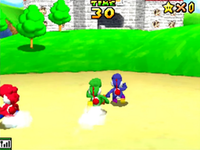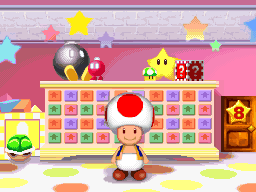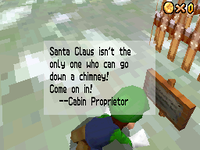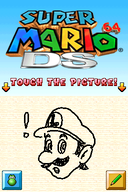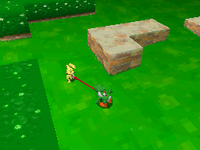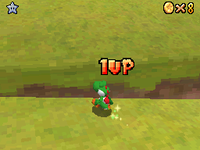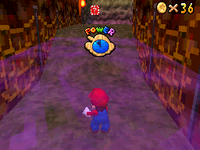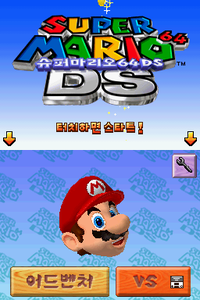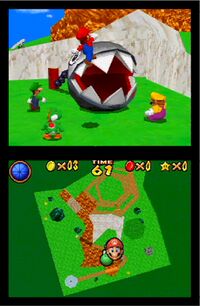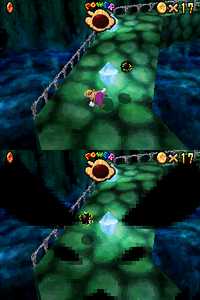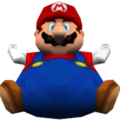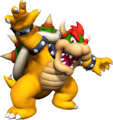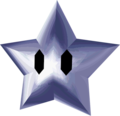Super Mario 64 DS
- This article is about the released remake of Super Mario 64. For the canceled Nintendo 64DD sequel, see Super Mario 64 2. For the microgame in WarioWare: Move It!, see Super Mario 64 DS (microgame).
| Super Mario 64 DS | |||||||||||||||
|---|---|---|---|---|---|---|---|---|---|---|---|---|---|---|---|
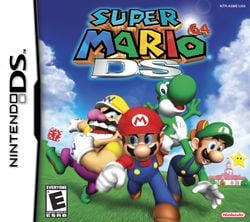 For alternate box art, see the game's gallery. | |||||||||||||||
| Developer | Nintendo EAD | ||||||||||||||
| Publisher | Nintendo | ||||||||||||||
| Platform(s) | Nintendo DS, Virtual Console (Wii U) | ||||||||||||||
| Release date | Nintendo DS: Template:ReleaseVirtual Console (Wii U): Template:Release[?] | ||||||||||||||
| Language(s) | English (United States) French (France) German Spanish (Spain) Italian Japanese Simplified Chinese Korean | ||||||||||||||
| Genre | 3D platformer, action-adventure | ||||||||||||||
| Rating(s) | Original release:
| ||||||||||||||
| Mode(s) | Single player, multiplayer (2–4) | ||||||||||||||
| Format | Wii U: Nintendo DS:
Game Card
| ||||||||||||||
| Input | Wii U: Nintendo DS:
| ||||||||||||||
| Serial code(s) | NTR-ASMJ-JPN (Japan) NTR-ASMP-EUR (Europe) | ||||||||||||||
Super Mario 64 DS (originally known as Super Mario 64 × 4 during development)[2] is a 2004 game from the Super Mario series made for the Nintendo DS. It is the first game of the Super Mario franchise released for the system and also the first 3D Super Mario game for a handheld console. The game is an enhanced remake of the Nintendo 64 game Super Mario 64, bearing some new features on its storyline, gameplay, and improved graphics. Like the original game, Super Mario 64 DS was released as a launch title.
Unlike in Super Mario 64, Mario is not the only playable character (nor is he even available at the start); Yoshi, Luigi, and Wario become playable characters and join the adventure to rescue Princess Peach from Bowser. Super Mario 64 DS is the first and so far the only game of the Super Mario series where Wario is playable. It is also one of the three Super Mario games where Yoshi is fully playable and not exclusively controlled by any of the other characters, the others being Super Mario Run and Super Mario Bros. Wonder.
Other new features within the game include a wireless multiplayer VS mode, in which up to four players can play simultaneously on each Nintendo DS connected together locally (though this cannot be done on the Wii U Virtual Console version except for the single-player training), mini-games to play with each character, and new additions to the story mode, such as new courses, missions, and bosses.
Story
From the instruction booklet:
"Please come to the castle. I've baked a cake for you."
At the invitation of Princess Peach, Mario, accompanied by party crashers Luigi and Wario, enter the Mushroom Castle.
But when the three don't come out of the castle for a long time, Yoshi decides to check up on them.
Upon entering the castle, Yoshi discovers that no one is there. According to Toad, Bowser has stolen the Power Stars guarding the castle and locked Princess Peach into the walls and paintings. Maybe Mario and his friends have been captured in the paintings, too!
Now it's up to Yoshi to rescue Princess Peach, Mario, Luigi, and Wario from the castle's paintings and walls!
Princess Peach writes a letter to Mario, telling him to come to her castle because she baked a cake for him. This letter is assumed to be a clever forgery from Bowser, who guesses that Mario and his friends would come looking and so employs his minions to capture them beforehand.
Mario arrives outside the castle through a Warp Pipe, followed by Luigi and Wario. The three then make their way to the castle entrance. Yoshi is seen asleep on the roof the entire time, only to later be awakened by one of the Lakitu Bros., who reveals that the others have not returned yet; immediately, Yoshi decides to locate them.
Yoshi tries to enter the castle, but the doors are locked. The Lakitu Bro says that he saw a rabbit with the key in his mouth. After Yoshi grabs the rabbit, the rabbit gives up the key to him. When Yoshi finally goes inside, he hears a voice from Bowser telling him, "Welcome. No one's home! Now scram--and don't come back! Gwa ha ha!" A Toad informs Yoshi that Bowser and his army have kidnapped Peach and stolen the Power Stars. He also concludes the last time he saw the heroes is when they jumped into the Bob-omb painting. Yoshi then decides to investigate. Eventually, Yoshi starts collecting Power Stars, rescuing Mario, Luigi, and Wario along the way, and the four continue to collect the Power Stars in order to save Peach from Bowser.
There are alternate endings for Super Mario 64 DS. Depending on which characters the player saves, they may or may not appear during the ending. Mario and Yoshi are always present in the ending. For each alternate ending, a different cake is awarded, featuring the characters that appeared in the ending as the cake figures. If the player does not drain the moat, then it does not appear as if it were drained. Also, if the player does not finish Snowman's Lost His Head on Cool, Cool Mountain, then the snowman's body is not seen in the ending.
Gameplay
As in Super Mario 64, the courses are accessed by the different paintings on the castle's walls. While up to 120 Power Stars can be collected in the original, 150 can be collected in Super Mario 64 DS, 30 more than in the original game.
Controls
Making use of the Nintendo DS's features, the player is offered three different ways to control the character. All three modes are always accessible by pressing the ![]() button.
button.
- In Standard Mode, the chosen character is controlled with the Control Pad. The stylus can also be used in Standard Mode.
 is used for jumping;
is used for jumping;  is used for punching, kicking, and sticking out Yoshi's tongue; and
is used for punching, kicking, and sticking out Yoshi's tongue; and  is used for dashing. The
is used for dashing. The  button is used for crouching, while
button is used for crouching, while  handles the camera together with the
handles the camera together with the Control Pad. Additionally, if the player is playing as Mario and presses
 while sliding down a wall, Mario wall-kicks. Compared to Mario in Super Mario 64, where he was moving as fast as the player tilted
while sliding down a wall, Mario wall-kicks. Compared to Mario in Super Mario 64, where he was moving as fast as the player tilted  of the Nintendo 64 Controller, the characters in Super Mario 64 DS move much more slowly when the run button is not pressed.
of the Nintendo 64 Controller, the characters in Super Mario 64 DS move much more slowly when the run button is not pressed. - In Touch Mode, the character is controlled by having the player move their thumb or the
stylus across the Touch Screen. By using the thumb or stylus, the player can adjust the character's speed and direction in a manner similar to what was possible with the Nintendo 64's control stick. Jumping, crouching, and kicking are still executed with the buttons.
- In Dual-Hand Mode, the character is controlled with the stylus, and jumping, kicking, and crouching are done by utilizing either the buttons (for left-handed players) or the
Control Pad (for right-handed players). The movement radius is larger with this control option, and all camera adjustments are done with the Touch Screen as well. The
 and
and  buttons are not used.
buttons are not used.
On the Nintendo 3DS and the Wii U GamePad, however, /
makes for a more authentic feel of using the Circle Pad/Joystick, making for better and easier controls. However, the player still needs to press
![]() to run, and the game still registers only eight different inputs, not the full range of a circle. In the options, the player can change how audio comes out of the speakers and the settings of the backlight. For sound, the player can choose between stereo, surround, and headphones. The backlight can be toggled on and off.
to run, and the game still registers only eight different inputs, not the full range of a circle. In the options, the player can change how audio comes out of the speakers and the settings of the backlight. For sound, the player can choose between stereo, surround, and headphones. The backlight can be toggled on and off.
Character selection
To switch between characters, there are three doors in the princess's room, each symbolizing the character's first letter of his name. To use him, the player must go through the door, and the corresponding character comes out of the door. Reentering the door of the character currently selected switches the player back to playing as Yoshi. There are four doors in total. However, the white-bordered door does not unlock a playable character but instead contains a secret Power Star, which can be unlocked if the player is able to catch the eight glowing rabbits. Once the Power Star is obtained, the player can reenter the door, but there is no effect afterwards (Boo laughs are heard), and the player's character simply exits it and groans.
Characters
In order to fully complete the game, the player needs to find three unlockable characters, who were trapped behind doors by Bowser. The following table below shows how good each character is in a certain stat. Each has his own special abilities, strengths, and weaknesses. The instruction booklet shows each character's stats and indicates his abilities with stars. However, it omits the rating for swimming speed and does not account for differences in physics that affect the stats. Mario, for example, has a higher top running speed than Luigi. Additionally, each character has different air speeds; Mario's jumps are higher than Yoshi's (most notably his triple jump), and Mario also moves farther forward, tied with Luigi.
| Name | Description | How to unlock | Stats | |||
|---|---|---|---|---|---|---|
| Yoshi
|
As the first and default character of the game, Yoshi must find and free Mario, Luigi, and Wario, who have been imprisoned from the clutches of Bowser and his minions. Yoshi has average running speed but quite slow swimming speed. His jumping ability is generally worse than both Mario's and Luigi's, though better than Wario's, as Yoshi is able to flutter-kick (when |
Available from the start | Power | ☆☆☆ | ||
| Speed | ★★☆ | |||||
| Jump | ★★★ | |||||
| Mario
|
Mario is trapped behind a door by Goomboss and is required to complete the game without the use of glitches, since he is the only one who can enter the final Bowser level, Bowser in the Sky. Using Yoshi from the starting point in the castle, the player should go up the stairs to the right 1-★ door. The player should go straight to the next door, go through the 8-★ door, and hop into the Mario painting. The player has to locate Goomboss by jumping into a hollow tree stump at the highest point of the level into a spot marked "X" on the map, and fight him by spitting Goombas at him for Mario's Key. The player then has to go back to the princess's room and unlock the "M" switching room to free Mario. Mario's stats in every category are average, and he plays similarly to his Super Mario 64 self. He has the fastest running speed of the four heroes, and he is tied with Luigi for the highest jump height, making him preferred on certain timed segments. Mario is the only character who can perform the wall kick. His Power Flower ability is Balloon Mario, which lets him float to normally unreachable distances. Mario is also the only character who can access the item called "Wings," turning him into Wing Mario, which also allows him to reach greater heights by flying. | Defeat Goomboss in Goomboss Battle as Yoshi. | Power | ★★☆ | ||
| Speed | ★★☆ | |||||
| Jump | ★★☆ | |||||
| Luigi
|
Mario's younger twin brother, Luigi, is optional to find but is required to obtain certain Power Stars that the others cannot retrieve. The player has to jump into a painting on the top floor of Big Boo's Haunt as Mario. There, Mario must go through the door where he hears King Boo's laugh, although some of the doors return the player to the entrance of the sub-level. When Mario reaches the end, he has to fight King Boo himself with any attack except jumping for the Luigi Key, which is used to open the door to obtain Luigi. Luigi is slightly weaker than Mario; Luigi's attacks do the same damage, but he moves more slowly when carrying objects or enemies. He is the fastest swimmer of the four heroes. Luigi is tied with Mario for the highest jumps. Luigi, however, is more maneuverable in the air than his comrades. After a normal jump or double jump, he can scuttle (which is similar to Yoshi's flutter kick) to briefly slow down his descent. After performing a backward somersault, he spins as if he jumped on a Fly Guy and descends slowly. Luigi can also briefly run on water, which is especially useful after a charged dash. Luigi is about as tall as Wario. Luigi's Power Flower ability is Vanish Luigi, which functions identically to Vanish Mario from the original game and allows Luigi to pass through certain walls for a short time. | Defeat King Boo in Big Boo Battle as Mario. | Power | ★☆☆ | ||
| Speed | ★★☆ | |||||
| Jump | ★★★ | |||||
| Wario
|
Like Luigi, Wario is optional to find but is needed to obtain Power Stars that the others cannot retrieve. Once the Key Door right at the head of the stairs in the main lobby is unlocked, Luigi has to go inside, then get past another door leading to Snowman's Land. There are two Power Flowers, so the player has to use Luigi to go transparent into the mirror by the Snowman's Land wall (certain glitches allow Yoshi and Mario to unlock Wario, but only Luigi can be used without glitches), and he has to fight Chief Chilly by pushing him into the freezing water three times for the Wario Key, which is used to open the door to find Wario. Wario has the worst speed stats and jumping capabilities of the four heroes, but he is by far the heaviest and strongest, being able to move faster when carrying objects and enemies and smash through Black Bricks and other heavy objects. Wario's strength allows his punches to deal double damage to Eyerok, defeating each hand in only two hits instead of three. In the VS mode, Wario has the unique ability to pick up stunned opponents, spin them, and throw them, in a similar fashion to throwing Bowser. Wario can also ground-pound objects with twice the strength of the other characters. His height is about the same as Luigi's. Wario's Power Flower ability is Metal Wario, which functions identically to Metal Mario in the original game. This form gives Wario invulnerability to enemy attacks, lava, and freezing water, as well as the ability to walk underwater. Wario still takes falling damage, however. | Defeat Chief Chilly in Chief Chilly Challenge as Luigi. | Power | ★★★ | ||
| Speed | ★☆☆ | |||||
| Jump | ★☆☆ | |||||
Colored caps
In the painting worlds and some secret courses, the caps of Mario, Luigi, and Wario can be found and are visible on the Touch Screen. When a cap is put on, the player's character turns into the corresponding character who owns the cap. He gets all moves of the character who owns the cap, including the Power Flower and Wings power-ups, but keeps his original voice. The caps are usually found on the heads of Goombas, Boos, or Dorrie; on land or underwater; or on any other enemy.
When the player is hit by an enemy, the cap topples off, and the character needs to retrieve it within a limited time. When the cap disappears, it reappears on a different, set location in the course. If Mario, Luigi, or Wario loses his original cap, he cannot pick up any other characters' caps or use Power Flowers until he retrieves his own. All of them also take double damage when hurt.
With Yoshi, a player can select the cap when selecting a Star right after jumping into a painting. If a cap is selected, Yoshi puts it on after entering the course.
| Image | Name | Description
|
|---|---|---|
 |
Mario's cap | A red cap that turns the character into Mario when obtained. |
 |
Luigi's cap | A green cap that turns the character into Luigi when obtained. |
 |
Wario's cap | A yellow cap that turns the character into Wario when obtained. |
Coins
Coins can be collected by every character. In every course, there are a little over 100 coins, and collecting 100 in each gives the player 15 extra Stars for the 15 courses. After successfully completing a mission by grabbing a Star, the player gets an extra life for every 50 coins collected (this, however, does not work if the player exits the course via the menu). The highest number of coins that the player can collect is 255. They can be found on land, in the sea, in enemies, etc. They also refill the player's Power Meter by one wedge for each coin collected.
There are three types of coins:
- Yellow Coins are worth one coin and are found in most enemies.
- Red Coins are worth two coins and have to be collected in groups of eight during one mission in each world and in some secret courses for a Power Star to appear.
- Blue Coins are worth five coins and are often temporary. They are found in tougher enemies or on slides, or they do not appear until the player hits a blue Switch.
Power Flower powers
Each of the four characters has a special power from the Power Flower found inside red ? Blocks, replacing the three caps from Super Mario 64. Only Mario can get something other than a Power Flower from a ? Block, which is the "Wings" (a white feather) to transform him into Wing Mario for 60 seconds. Once he has taken the flower, a hero uses his new powers for a short time. If anyone other than Yoshi hits a ? Block without wearing his cap, a Bob-omb comes out instead. In some ? Blocks (such as the ones in Whomp's Fortress and Snowman's Land), a Bob-omb is always spawned if the blocks are broken by a certain character, even with his cap on. The three powers that Mario can use in Super Mario 64, namely the Wing, Invisibility, and Metal powers, can now exclusively be used by Mario, Luigi, and Wario, respectively. However, Luigi's and Wario's powers last shorter compared to Mario's equivalent forms in Super Mario 64.
| Image | Name | Description
|
|---|---|---|
 |
Fire Power | Yoshi's fiery breath has the ability to melt blocks of Ice and roast enemies with fire blasts. The player uses |
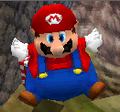 |
Balloon Power | Balloon Mario has the ability to float in a puffed-out formation of the stomach to reach high-up places like a Power Balloon. The player must press |
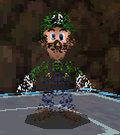 |
Invisibility Power | In this form, Luigi has the ability to become invisible and is able to pass through certain walls, such as grates and paintings. The player can control Luigi as normal. Vanish Luigi is not immune to lava, quicksand, or drowning. He cannot get hurt by enemies, like Metal Wario, but unlike Metal Wario, he simply passes through them, instead of damaging the enemies. The ability wears off within a short amount of time. |
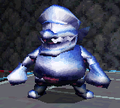 |
Metal Power | This form gives Wario the ability to become heavy metal, which gives him more power and invincibility. Merely touching an enemy or walking into it defeats it and does not hurt Metal Wario. He also sinks, and when submerged in water, he can walk on seabeds. Normal controls are used in this form. The ability wears off after a short amount of time. |
Rabbits
- Main article: Rabbit
In addition, there are many rabbits to catch. They replace MIPS from the original game and have the same name internally and in the Shogakukan guide. The rabbits give up keys to unlock mini-game drawers in the Rec Room when caught. Seven rabbits spawn around the castle as each character, and any rabbits not meant for a certain character do not spawn unless that character is selected. Wario catches orange ones, Luigi catches green ones, Mario catches pink ones, and Yoshi catches yellow ones, for a total of 28 rabbits. To make the rabbits appear, the player must talk to the Toad in the Rec Room. Upon the player talking to the Lakitu Bro at the start of the game, an extra yellow rabbit appears near the hedge maze, and it provides the key to the front doors of the castle. Though intended to be caught as Yoshi, if unlocking the front doors is avoided using glitches, the rabbit still spawns when accessed as any other character, despite appearing yellow. Once caught, this rabbit never reappears and can never be a glowing rabbit.
Rabbit locations
The following table displays information pertaining to the whereabouts of each rabbit, which mini-game its related key unlocks, and the number of Power Stars that are required to access the rabbit. For more information regarding the mini-games unlocked, view the section about the Rec Room.
 Yoshi's rabbits, colored yellow | ||
|---|---|---|
| Location | Mini-game unlocked | Power Stars required |
| Outside the castle, at the end of the bridge, to the left. | Puzzle Panel | 1 Star |
| Outside the castle, at the end of the bridge, in the middle. | Hide and Boo Seek | 1 Star |
| Outside the castle, at the end of the bridge, to the right. | Boom Box | 1 Star |
| Outside the castle, in a patch of flowers to the right. | Tox Box Shuffle | 1 Star |
| Outside the castle, at the bottom of the drained moat. | Puzzle Panic | 12 Stars |
| Outside the castle, in the garden, near the small hedge maze. | Which Wiggler? | 1 Star |
| In the basement, in front of the entrance to Lethal Lava Land. | Mix-a-Mug | 12 Stars |
 Mario's rabbits, colored pink | ||
| Location | Mini-game unlocked | Power Stars required |
| Outside the castle, left of the bridge, near the waterfall. | Sort or 'Splode | 8 Stars |
| Outside the castle, at the bottom of the moat (but only after it has been drained). | Shell Smash | 12 Stars |
| Inside the room with the entrance to Jolly Roger Bay. | Trampoline Time | 8 Stars |
| In the basement, in front of the entrance to Lethal Lava Land, to the left. | Connect the Characters | 12 Stars |
| In the basement, in front of the entrance to Lethal Lava Land, to the right. | Bounce and Trounce | 12 Stars |
| On the second floor of the castle, at the very top of the stairs. | Trampoline Terror | 31 Stars |
| On the second floor of the castle, in the room with the entrance to Snowman's Land and with the large mirror wall. | Shuffle Shell | 31 Stars |
 Luigi's rabbits, colored green | ||
| Location | Mini-game unlocked | Power Stars required |
| Outside the castle, on the left of the small hedge. | Pair-a-Gone and On | 15 Stars |
| On the second floor, on the right side of the doorway, with the entrance to Wet-Dry World. | Memory Master | 31 Stars |
| Behind the castle, in the courtyard. Found by backward-somersaulting right outside the doorway. | Picture Poker | 15 Stars |
| In the basement, in the room where the water can be drained from the moat (after the player does it). | Mushroom Roulette | 15 Stars |
| In the room with the entrance to the Bob-omb Battlefield. | Lucky Stars | 15 Stars |
| In the room with the entrance to Mario's painting, Goomboss Battle, behind the Rec Room/Sunshine Isles. | Mario Slot | 15 Stars |
| Outside the castle, on top of the roof. | Super Mario Slot | 150 Stars |
 Wario's rabbits, colored orange | ||
| Location | Mini-game unlocked | Power Stars required |
| Outside the castle, over the wooden bridge, to the far right. | Bingo Ball | 31 Stars |
| In the room with the entrance to Whomp's Fortress. | Coincentration | 31 Stars |
| Behind the castle, in the courtyard, behind the Star Fountain,[3] near the two signs. | Slots Shot | 31 Stars |
| In the basement, in the dead end, near the Toad. | Psyche Out! | 31 Stars |
| On the second floor of the castle, in the halls with the entrances to Tiny-Huge Island. | Lakitu Launch | 31 Stars |
| On the third floor of the castle, near the entrances to Tick Tock Clock, Rainbow Ride, Over the Rainbows, and Bowser in the Sky. | Intense Coincentration | 50 Stars |
| On the third floor of the castle, in the upper alcove to the left, near the entrance to Over the Rainbows. | Giant Snowball Slalom | 50 Stars |
To unlock the white-bordered door within the princess's room, the player must catch eight glowing rabbits. Once the player has collected at least 50 Stars and the given rabbit has already been caught, there is a 1/32 chance for the rabbit to be glowing white each time the area the rabbit is in is loaded. This chance increases to 1/16 once at least 80 Stars have been collected. Upon catching a glowing rabbit, the player is informed of how many glowing rabbits are left to be caught or, on the final rabbit, is given the key to the white-bordered door. Once the key to the white-bordered door has been collected, rabbits no longer have any chance to be glowing.
Keys
Three keys are used to unlock Mario, Luigi, and Wario. They are obtained after boss battles. Mario's Key is obtained once Goomboss is defeated, Luigi's key is obtained once King Boo is defeated, and Wario's key is obtained once Chief Chilly is defeated.
Upon catching all of the eight glowing rabbits, the player receives a key that unlocks the white-bordered door in the princess's room. The first time the player opens it and enters, they find a Power Star. However, if they come back after taking it, Boos' laughs can be heard, and the player character comes out of the door, startled.
At the beginning of the game, after catching a rabbit near the small hedge on the left of the castle, Yoshi gets the key to unlock the castle's front doors.
After clearing the first two Bowser levels, the player receives Big Keys to access the basement and second floor, respectively.
Courses and missions
The following table displays information regarding each course, the Power Stars found within each course, how to get the Stars, and what character is required to obtain the Stars. During some missions, the player can find a cap of another character that transforms them into the character that owns the respective cap. The number of caps in a course varies and is based on which characters have been rescued, with few exceptions. Yoshi does not have a cap but is able to choose from the rescued characters' before selecting a mission. When the player's coin meter reaches 100 for the first time in a particular course, a bonus Power Star appears, making a total of eight Power Stars available in each course. If one of the characters receives a Power Star and redoes the mission, the Power Star appears as blue and does not add to the total. Bowser is fought in three courses, each of which is behind a Big Star Door, and a certain number of Power Stars is required to open the doors. Big Star Doors can be opened only with Mario, though once one is opened, any character can enter the door. The only exception to this is the Big Star Door leading to the final Bowser course; if any character other than Mario enters it, that character is brought to the endless stairs instead.
A - This mission does not appear in the original, replacing Shoot to the Island in the Sky.
B - This mission does not appear in the original.
C - This course does not appear in the original.
D - This mission is in the original, but the Silver Stars replace the coins.
E - This mission does not appear in the original, replacing Five Itty Bitty Secrets.
F - This mission is in the original, but Luigi is required to get it.
G - This mission is in the original, but a Star Switch makes it appear in its original location.
Bosses
The following table shows all of the bosses in the game.
| Template:Color-link | Template:Color-link | Template:Color-link | Template:Color-link | ||||||||||||||||
|---|---|---|---|---|---|---|---|---|---|---|---|---|---|---|---|---|---|---|---|
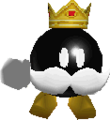
|
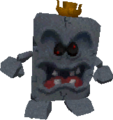
|

|

| ||||||||||||||||
| A giant Bob-omb at the Bob-omb Battlefield that attacks by throwing smaller Bob-ombs in his first battle. The Big Bob-omb can be defeated by sending the Bob-ombs back at him three times. In his second battle, the Big Bob-omb attacks by tossing the player around the stage, but he can still be defeated if a cap-wearing character picks him up and tosses him three times. | A giant Whomp at Whomp's Fortress that tries to crush the player by falling on top of them. They must avoid the attack and ground-pound the king's back as he is about to get up. Doing so three times defeats him. | A giant Goomba that holds the key to Mario's door and walks around the stage with some Goombas. Yoshi can defeat him by spitting a Goomba at him three times; however, Goomboss spawns more Goombas and gets faster after each hit. If he is fought by Yoshi, the Goombas spawn behind Goomboss. If he is fought by anyone else, the Goombas spawn in front of him. | Mario's archenemy and the main villain of the game. Bowser's tactics differ depending on when he is fought, but he usually attacks by breathing fire and ramming into the player. He can be defeated by tossing him into a spiked orb once the first two times he is fought. For the final encounter, the player must throw him into spiked orbs three times to defeat him. | ||||||||||||||||
| Missions | Missions | Missions | Missions | ||||||||||||||||
| Big Bob-omb on the Summit Big Bob-omb's Revenge |
Chip Off Whomp's Block | Goomboss Battle | Bowser in the Dark World Bowser in the Fire Sea Bowser in the Sky | ||||||||||||||||
| Template:Color-link | Template:Color-link | Template:Color-link | Template:Color-link | ||||||||||||||||

|

|

| |||||||||||||||||
| A giant Boo that is fought three times in the game in Big Boo's Haunt. The Big Boo attacks by ramming the humans if they are not looking at him. The player can defeat the Big Boo by hitting him three times with any attack except jumping when he is not invisible. | A giant Mr. I that hides in a secret room at the top of Big Boo's Haunt along with a Boo. He attacks by shooting blue flames at the player and can be defeated if they run around him enough times, making him dizzy. | A similar foe to the normal Big Boo that guards the key to Luigi's door. He can warp between realities and attack by ramming into the player or spitting blue flames at them. This Big Boo can be defeated by hitting him three times with any attack other than jumping. | A large Bully that is fought two times in Lethal Lava Land. He attacks the player by ramming into them, trying to push them into the lava. To defeat the Big Bully, the player must do the same by repeatedly hitting him towards the lava. | ||||||||||||||||
| Missions | Missions | Missions | Missions | ||||||||||||||||
| Go on a Ghost Hunt Ride Big Boo's Merry-Go-Round Big Boo's Balcony |
Eye to Eye in the Secret Room | Big Boo Battle | Boil the Big Bully Bully the Bullies | ||||||||||||||||
| Template:Color-link | Template:Color-link | Template:Color-link | Template:Color-link | Template:Color-link | |||||||||||||||
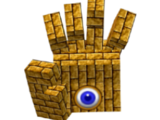
|

|

|

|
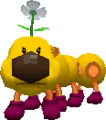
| |||||||||||||||
| A pair of disembodied stone hands in Shifting Sand Land that attacks by punching the player and slamming down his fists at them while leaving an eye exposed. The player must punch each eye three times (or twice if playing as Wario) to defeat Eyerok. If playing as Yoshi, the player must ground-pound into, slide-kick, or spit fire at him. | A large Bully encased in ice that has the same fighting style as the Big Bully. However, the platform that he is fought on is made of ice as well, making it very slippery. Pushing him into the freezing water once defeats him. | A larger Chill Bully that guards the key to Wario's door. Luigi must push him into the ice-cold water three times to defeat him; however, Chief Chilly makes the platform that he is fought on smaller after each hit. | Five enormous fire-breathing Piranha Plants that rapidly shoot up from the ground when approached, shrinking down after attacking. While visible, they are vulnerable to punches. | A caterpillar that is angry at the player for flooding his house. He attacks by charging at the player. When his head is jumped on two times, he becomes angrier and attacks at a much faster speed. When jumped on once more, he is defeated. | |||||||||||||||
| Missions | Missions | Missions | Missions | Missions | |||||||||||||||
| Stand Tall on the Four Pillars | Chill with the Bully | Chief Chilly Challenge | Pluck the Piranha Flower | Make Wiggler Squirm | |||||||||||||||
VS mode
The game includes a multiplayer VS mode. The mode can be accessed from the Title Screen by tapping the orange "VS" button at the bottom left of the Touch Screen. The VS mode supports only single-card gameplay, with Player 1 as the host with the inserted cartridge and Players 2–4 using the DS Download Play feature. The VS mode starts in a waiting area, which takes place in a castle interior, as shown from the top screen. It depicts a desert sand-colored wall with a large painting of a cloudy sky, two large pillars located left and right each, a red carpet on the checkered floor that leads up to the wall, and red drapes hanging on the ceiling.
While other players are preparing, the bottom screen reads "Waiting for opponents..." When other players have joined, their names are displayed on Player 1's screen. The host can then tap the "TOUCH TO START" notice to start the battle. While in the waiting room, players can press ![]() to change the settings and press
to change the settings and press ![]() to change their controller layout. Every player controls a Yoshi and is no different in terms of abilities; Player 1 controls a Green Yoshi, Player 2 controls a Red Yoshi, Player 3 controls a Blue Yoshi, and Player 4 controls a Yellow Yoshi. Player 1 can select one of four stages, all of which appear as locations in the main game, by tapping the corresponding icon on the Touch Screen. When a stage is selected, the four Yoshis sprint toward the large painting and jump into it. They are taken to the selected course, and the gameplay starts.
to change their controller layout. Every player controls a Yoshi and is no different in terms of abilities; Player 1 controls a Green Yoshi, Player 2 controls a Red Yoshi, Player 3 controls a Blue Yoshi, and Player 4 controls a Yellow Yoshi. Player 1 can select one of four stages, all of which appear as locations in the main game, by tapping the corresponding icon on the Touch Screen. When a stage is selected, the four Yoshis sprint toward the large painting and jump into it. They are taken to the selected course, and the gameplay starts.
The objective is for players to collect the most Power Stars and coins. At the top center of the screen is a countdown timer, which starts at 30. Players can hold up to five Power Stars. When a Yoshi is attacked by an obstacle or opponent, it loses a Power Star, which starts to bounce around the course. As such, Power Stars function very similarly to Silver Stars. The Yoshi can reclaim the Power Star before their opponent does. Mario's cap, Luigi's cap, and Wario's cap are located around the stage, and they transform the Yoshis into Mario, Luigi, and Wario, respectively. Yoshis can swallow their opponents unless their opponent is wearing a cap. A few of the stages have a large yellow block that contains a pair of wings, which temporarily grant Yoshi, Luigi, and Wario the ability to fly. Wario is the only character with an ability exclusive to the VS mode, the Wild Swing-Ding, where if Wario attacks an opponent, they get knocked out slightly longer, allowing him to grab the opponent, swing them around, and throw them.
The player that ends with the most Power Stars wins. If two or more players are tied with the same number of Power Stars, then the player with the most coins wins. The results are shown in the waiting room, where the winning Yoshis cheer and the losing Yoshis cry. The collected Stars and coins are shown for each Yoshi. On the Touch Screen, it tells whether that player won or lost. The top screen then shows the number of rounds that each Yoshi won or lost, and there is a Star trophy icon to the left of each number.
Stages
| Location | Description |
|---|---|
| Castle Grounds | The outdoor area in front of the Mushroom Castle. It has a few differences, including ropes that block the castle's doors and cannon, a moving platform added to the moat and lake, and a Chain-Chomp bouncing around the area. One of the Power Stars is at the tip of its chain. |
| Sunshine Isles | In the main game, this course is accessed from a painting in the Rec Room. There are a few differences: The background music is changed, the sky is faced differently, there are no enemies, and there is a yellow block containing a feather. |
| The Princess's Secret Slide | In the main game, this course is located in the princess's room. The caps are found at both the beginning and end of the level. It is the only course where Power Stars are not found in Star Spheres. If the player falls off, they are returned to the beginning of the slide. |
| Battle Fort | In the main game, this course is accessed from the courtyard of the Mushroom Castle, through a hole under a Brick. The course features iron balls (which Wario can break), and in the VS mode, it also features no enemies and two yellow blocks containing feathers. |
Rec Room
Once keys are gained, they can open shelves to unlock mini-games. Yoshi's mini-games are puzzle-based, Mario's are action-packed, Luigi's are casino (or luck-based) games, and Wario's do not have a specific theme.
The following table is a complete listing of all the mini-games, their in-game instructions, and the numbers of Power Stars needed to unlock the mini-games. Most of these mini-games are reused in New Super Mario Bros., and they also have multiplayer, along with some new ones. There are 36 mini-games in total. Each character has nine: The first two are available from the start, while the other seven are obtained from catching the rabbits.
| Yoshi's mini-games | ||
|---|---|---|
| Mini-game | In-game instructions | Power Stars needed to unlock |
| Wanted! | It's easy to get lost in a crowd! Find the one who disappeared and touch him. There he is! | 0 |
| Loves Me...? | Play this mini-game for advice on your love life! Pluck the petals to find out how your crush feels about you. | 0 |
| Hide and Boo Seek | Rub the Touch Screen where the Boos are hiding! For the first 15 levels, you get 3 seconds to find them. After that, you only get 2 seconds. | 1 |
| Puzzle Panel | Match the Touch Screen picture to the top screen. Touch a panel to turn over the surrounding panels. Harder levels will take more turns to solve. | 1 |
| Boom Box | Each time you open a treasure chest, you'll hear a sound. Open 2 chests with the same sound. Win by matching all the pairs! | 1 |
| Tox Box Shuffle | Oh, no! Yoshi's trapped in a Tox Box! Find which one he's in to save him! | 1 |
| Which Wiggler? | Touch the Wiggler on the Touch Screen that matches the one on the top screen. Choose carefully, though; he has a terrible temper. | 1 |
| Mix-a-Mug | Line up the slots on the Touch Screen to form a face. Win more coins by matching the center face in the slots to the one on the top screen. | 12 |
| Puzzle Panic | This mini-game takes the Puzzle Panel to a whole new level. Put on your thinking cap. You're going to need it. | 12 |
| Mario's mini-games | ||
| Mini-game | In-game instructions | Power Stars needed to unlock |
| Mario's Slides | Guide Mario down the slides to the Star. Draw lines on the Touch Screen to create new routes for him. Collect 5 Stars to move up a stage. | 0 |
| Bounce and Pounce | Mario's in free fall, but he can bounce back if you touch him. Stomp the Fly Guys, but make sure he doesn't fall off the Touch Screen. | 0 |
| Sort or 'Splode | Guide Bob-ombs to the black carpet and Bob-omb Buddies to the red carpet. If you bring in a wrong-colored Bob-omb, it will blow up! | 8 |
| Trampoline Time | Draw a line on the Touch Screen to turn it into a trampoline. You can draw up to 3 lines at a time. Help Mario bounce to safety! | 8 |
| Shuffle Shell | Use the paddle to push the Koopa shells to the target. The closer the shells land to the center of the target, the more points you will earn. | 31 |
| Bounce and Trounce | Mario's surrounded by Fly Guys to trounce. Touch him on his left, right, or center to make him bounce in that direction. | 12 |
| Connect the Characters | Draw lines to match the characters' heads to their bodies. Press "GO!" when you're finished to see how you fared! | 12 |
| Shell Smash | Hit Koopa shells together to score points. Hit many in a row for even more points. Score even higher points by smashing green shells together. | 12 |
| Trampoline Terror | Only players with superb stylus skills will be able to make Mario bounce through the rings! | 31 |
| Luigi's mini-games | ||
| Mini-game | In-game instructions | Power Stars needed to unlock |
| Memory Match | Pick two matching cards to make them disappear. Clear all the cards to win. | 0 |
| Pair-a-Gone | Touch 2 identical cards that are connected vertically, horizontally, or diagonally to make them disappear. Clear them all to win! | 0 |
| Picture Poker | Get a better hand than Luigi to win! If you're confident your hand is best, increase the number of coins you bet! | 15 |
| Mushroom Roulette | Guess where the ball will land on the roulette wheel. Guess correctly to win coins! | 15 |
| Mario Slot | Touch the spinning slots to stop them. Get 3 items in a row to earn coins! The Superstar is wild. | 15 |
| Lucky Stars | From a pair of cards, pick the one with more Stars to win coins. Beat Luigi at his own game! | 15 |
| Pair-a-Gone and On | This game of Pair-a-Gone goes on forever! Test your skill and see how many cards you can clear. Go for the record! | 15 |
| Memory Master | If Memory Match was a piece of cake for you, try out this harder version. You now have more cards to play with. | 31 |
| Super Mario Slot | Touch the spinning slots to stop them. Get 3 items in a row to earn coins! The Superstar is wild. Are you feeling super lucky? | 150 |
| Wario's mini-games | ||
| Mini-game | In-game instructions | Power Stars needed to unlock |
| Bob-omb Squad | The parachuting Bob-ombs are destroying your flowers! Use your slingshot to knock them out of the air. Hit Lakitu to blow them all up. | 0 |
| Snowball Slalom | Rub the Touch Screen to roll the snowman's head to the goal before time runs out! Rocks will slow you down, as will touching his head! | 0 |
| Bingo Ball | Launch a ball into a numbered slot on the Touch Screen. That number will light up in the top screen. Get 3 numbers in a row to score! | 31 |
| Coincentration | Pay attention to where the falling coins land. Touch the blocks to retrieve the coins. But if you choose the wrong block, your game will end. | 31 |
| Psyche Out! | Are you psychic? Can you guess what's on the card's other side? Maybe if you stare at it long enough, a vision will come to you. | 31 |
| Slots Shot | The bars swing open when a ball goes in a Piranha Plant. Sink the ball into the pipe to trigger the slots Switch. Get 3 items in a row for a bonus! | 31 |
| Lakitu Launch | Shoot as many balls as you can into the tubs within the allotted time. | 31 |
| Intense Coincentration | There aren't as many falling coins this time around, but that won't stop Wario. Watch the coins carefully! | 50 |
| Giant Snowball Slalom | Roll the snowball over a longer course! As before, avoid rocks because they'll slow you down. | 50 |
List of changes from the original game
Although Super Mario 64 DS is a clear remake of the Nintendo 64 game Super Mario 64, there are some elements that were added in the game that the original game did not have, as well as elements that are seen only in the original game that were taken out or slightly tweaked in its remake.
Gameplay changes
General
- Mario, Luigi, Yoshi, and Wario are now all playable. Only Mario is playable in the original, while Yoshi makes an unplayable cameo appearance on the castle roof after the original game is finished, and Luigi and Wario did not make any appearances or cameos in the original. There were, however, rumors that Luigi could be unlocked in the original, but those have since been debunked, and he was planned to appear in the original game but was dropped out.
- On the Title Screen, Mario's or Yoshi's face can be dragged by the stylus. While being dragged, they become wireframe. The user can also design a custom picture to drag around. In the original, Mario's face can be pulled by the cursor. If the player taps Mario's or Yoshi's face, a drawing of Mario or Yoshi (respectively) appears. The third time the player taps Mario's face, a Luigi drawing appears instead.
- In the original game, Mario (the only character capable of wall-kicking in both the original game and the remake) cannot slide down walls. He is able to do so in the remake, making wall-kicking much easier to perform than in the original.
- Wall-kicking from a dive is now possible if Mario dives into a wall at a low enough speed.
- By holding
 to charge up a dash while standing still, then pressing any direction on the
to charge up a dash while standing still, then pressing any direction on the Control Pad, any character can transition from standing still to dashing at full speed.
- It is possible to grab ledges during a triple jump, whereas Mario must land above the platform surface in the original.
- The Power Flower has a different effect for each character: Mario is able to float, Luigi can become invisible, Wario can become a metal version of himself, and Yoshi can blow fire out of his mouth. Mario can also fly by collecting a feather. In the original, Mario is able to collect different caps to use these various abilities (excluding the fire and balloon power-ups), specifically the Wing Cap, the Vanish Cap, and the Metal Cap.
- There are eight Power Stars in each course. In the original, there are only seven in each course.
- There are 36 rabbits to catch. In the original, there is only one rabbit, MIPS, who is caught twice in the basement.
- There are 150 Stars in the whole game. There were 120 in the original.
- Wario is now able to pick up signs and throw them like any enemy that is picked up. He is also able to jump on signs and ground-pound them into the ground once. In the original version, Mario is not able to pick up signs, nor is he able to ground-pound them. He and the other characters cannot pick up signs but can ground-pound them twice.[5]
- The mushroom power-up was added, mainly found in Bricks, and it causes the player to grow to an enormous size (and gives Yoshi punching and kicking abilities as well as the ability to destroy Bricks). Within a time limit, one can defeat virtually every enemy, which could not be done in Super Mario 64. After destroying the first seven, the player receives an extra life for anything else they destroy. A 1990s Got Milk? commercial shows simulated footage from Super Mario 64 featuring a giant Mario, but it was impossible in the original version.
- As the Nintendo DS does not have the analog stick that the Nintendo 64 has, either the D-Pad or the stylus can be used (depending on the settings). However, the Circle Pad on the Nintendo 3DS somewhat simulates the classic analog stick from the original version.
- Klepto appears in three different levels, while in the original, he appears only in the level Shifting Sand Land.
- The
 and
and  buttons on the Nintendo DS control the camera. In the original, the
buttons on the Nintendo DS control the camera. In the original, the  buttons on the Nintendo 64 control the camera.
buttons on the Nintendo 64 control the camera. - Rabbits, when caught by the player, can unlock mini-games in the Rec Room. In the original, a rabbit provided hints and/or a Star.
- Silver Stars were added in the remake. During Silver Star missions, the player must collect five Silver Stars to make a Power Star appear.
- In the original, a glitch can cause Mario to gain excessive negative speed when repeatedly performing backward long jumps on certain surfaces such as slopes, stairs, and elevators. Like in other updated releases of the game, this glitch has been patched so that Mario and the others remain at intended speeds.
- There are three save files to play on. In the original, there are four.
- Mario could not destroy things that Wario could do in this game. He and the other characters also cannot even do it in this game.
- Star Switches are seen in this game. They make a Power Star appear for a limited time in a Star Sphere.
- The ability to bounce-slide-kick off lava once has been removed.
- The ability for Mario to wall-kick from a full-speed long jump has been removed. However, he can now wall-kick from a backward somersault, dive rollout, or slide-kick rollout (the latter two now allowing ledge-grabs, which means the Hazy Maze Cave and Bowser in the Sky can now be entered without jumping).
- In the original game, collecting a 100-Coin Star (or a Red Coin Star in a Bowser stage) would keep Mario's health where it was when he collected it. In the DS version, the player's health gets refilled.
- The Power Meter loses and gains power slower than in the original game after the player respawns from death or drops from high places.
- Diving at the end of a fall inflicts no damage, no matter how high the character fell from.
- Falling with the Wing Cap while holding the jump button does slow down the fall, but unlike in the original game, it does not prevent damage from falling.
- In the original, during the final scene after the credits (after everyone waves goodbye to the player), the cake awarded to Mario is displayed, and the player must reset the system to continue playing. However, in the remake, after the cake is shown, pressing any button takes the player back to the Title Screen.
- In the original game, when Mario goes to sleep in shallow water, he remains asleep after lying down. However, in the remake, after Yoshi, Mario, Luigi, or Wario stays asleep for a period of time, he immediately wakes up after lying down.
- Pokeys can no longer be safely jumped on to defeat them.
Course specific
- Hedges and an additional ramp that leads into the moat have been added to the Castle Grounds.
- The doors to the Mushroom Castle are now locked and require a key, which is obtained from a rabbit.
- The door on the top right corner of the lobby contains only two Peach murals (one still leading to The Princess's Secret Slide), as well as five additional doors. The three doors with letters above them allow the player to switch between characters; the remaining door contains a secret Power Star, and the door in the back center leads to the Rec Room and Goomboss Battle. In the original, the room is smaller and contains three Peach murals inside it (one leading to The Princess's Secret Slide).
- Two Power Flowers appear in the Mirror Room of the Mushroom Castle (four if the ones through the mirror are counted), but only if Luigi is used. In the original, no power-ups appear whatsoever in the room.
- After collecting all Stars, the player can be shot out of a cannon to the top of the Mushroom Castle. Three 1-UP Mushrooms can be found there, as well as one of Luigi's rabbits. Also present on the roof is a red ? Block, which gives the player a feather for Mario and a Power Flower for Luigi, Wario, and Yoshi. In the original game, Mario finds Yoshi on the roof. He awards the player 100 lives and a new animation for his triple jump, then jumps into the waterfall.
- The bottom layer of Whomp's Fortress has been expanded significantly, adding space for a Star Switch and its respective Power Star, along with several new enemies.
- Firing at the breakable walls in Whomp's Fortress no longer inflicts damage.
- The Star for Blast to the Stone Pillar is out in the open (like in the original Japanese version) and not in a yellow block.
- The strange toxic cloud in the Hazy Maze Cave inflicts knockback on the player's character.
- In the original game, Mario's cap did not despawn when he lost it in Snowman's Land. In the DS version, when Mario, Luigi, or Wario loses his cap in Snowman's Land, it gets stolen by a Mr. Blizzard.
- The interior of the igloo in Snowman's Land has been entirely changed in the DS version.
- On Cool, Cool Mountain, the pond next to the Mother Penguin is now frozen. After a Star Switch is pressed, a Power Star appears underneath the ice, and it can be obtained with Wario by ground-pounding.
- Over the Rainbows, known as Wing Mario Over the Rainbow in the original game, is no longer counted as a "cold" course, meaning Mario and others can fall asleep instead of shivering after idling long enough in this course.
Sound changes
- Upon the game's start-up, Mario does not say anything on the Nintendo logo screen and says, "It's-a me, Mario!" only on the Title Screen. In the original, he says, "It's-a me, Mario!" on the Nintendo logo screen and "Hello!" on the Title Screen.
- When a pipe appears at the start of a new game, Mario says, "Ha ha!" after a pause. In the original, he immediately says it after saying, "Yahoo!"
- When the Big Boos are hit in the original, they make the same sound as the Thwomp, but they do not do so in the remake.
- When Mario goes to sleep after idling for too long, he does not talk in his sleep, though this may be because it would have to be recorded for the other three characters.
- The penguins on Cool, Cool Mountain have slightly different crying sounds than they do in the original.
- Entering Rainbow Ride causes the sound effect for entering a mini-course to play; in the original, it plays the sound effect for entering any other main course.
- As with the Shindō Pak Taiō Version, Mario says, "Buh-bye!" instead of "So long kinga Bowser!" when throwing Bowser a great distance.
- Mario will say "Buh-bye!" whenever the player closes the DS and also says "It's-a me, Mario!" when the player reopens it.
- New music has been composed, such as the jingles for collecting the Silver Stars and flying with Hoot.
- Due to harware limitations(the DS lacks a sound chip), the sound is of a slightly worse qulity, though the underground theme that plays in Hazy Maze Cave has its intro slightly altered to be different from the original game.
Text changes
- When the player first enters Big Boo's Haunt in the original, they are greeted with "Come on in here...heh, heh, heh..." This was removed in the remake.
- In the original version, the Big Boo's laughs in the mission Go on a Ghost Hunt are written as "Ka ha ha ha!" In the remake, "Ha ha ha ha!" is written instead.
- The Big Bob-omb of the Bob-omb Battlefield is obsessed with his mustache. In the original, he is not shown to have any particular interests.
- Collecting a 1-UP Mushroom causes the words "1UP" to appear in orange text. In the original, no onscreen icon appears.
- In the original version, Princess Peach says, "Mario! The power of the Stars is restored to the castle...and it's all thanks to you! Thank you, Mario! We have to do something special for you..." and "Listen, everybody, let's bake a delicious cake...for Mario..., Mario," after being rescued. In the remake, she instead opens her speech with "Oh! Yoshi!"; says "Thank you all!" in place of "Thank you, Mario!"; and ends her speech with "Listen... Let's bake a delicious cake...for my heroes..., Yoshi!"
Graphical changes
- Many returning characters' models are much more detailed and smoothened, including Mario's, Bowser's, Yoshi's, Koopa Troopas' and Goombas'.
- Mario's and Bowser's models are updated to match their current appearances since Luigi's Mansion.
- A blue tint overlay and a layer of mist have been added underwater.
- The painting for Jolly Roger Bay is based on that in the original Japanese version.
- Peach wears her hair up in a ponytail instead of wearing her hair down. This is based on her appearance in Super Mario Sunshine, which was the debut of her ponytail hairstyle.
- All the textures are redone to fit the new capabilities and resolution of the system.
- The sun and moon found in level skyboxes are now separate objects from them. Additionally, the pyramids seen in the background of Shifting Sand Land have been removed.
- In the remake, coins are octagonal, but in the original, they are circular. Additionally, they are 3D objects in the remake, while they were animated 2D sprites in the original game.
- There are red ? Blocks and yellow ! Blocks. Like in the original, yellow ! Blocks are the standard ones, whereas the new red ? Blocks now share the functionality of the red, green, and blue ! Blocks of the original.
- Several enemies have updated designs. Many of the designs from this game end up becoming the standard for later games.
- Bubs were depicted as resembling Blurps with an orange, scale-like texture and plain fins, but they have a traditional design in the remake.
- Bubbas were depicted as a larger version of the aforementioned Bubs with shades, but due to the Bubs looking on-model, they were revised to look more like Boss Bass.
- In the original, Boos have blue eyes and are oblong, but in the remake, they use their current appearance from Mario Party 4, where they have black eyes and are more spherical.
- Mr. Blizzards have zigzag mouths and wear buckets like hats, while in the original, they have circular mouths and wear nothing on their heads. Their defeat animation shows them spinning (similar to Mr. I's) instead of falling on their sides.
- Lakitu's Cloud looks less like a real cloud and has a happy face, while in the original, it resembles a normal cloud. Additionally, Lakitu is smiling in the remake, while in the original, he has a neutral expression.
- In the original, Thwomps are blue and cube-shaped, while in the remake, they use their Mario Kart: Double Dash!! design and, as such, are a gray-green color, spiked, and rectangular. Despite the spikes, the player can still stand on top of them.
- Whomps now have gray rectangles for hands instead of purple spheres.
- Heave-Hos have their faces replaced with a pair of digital eyes.
- Skeeters are now light blue instead of turquoise.
- Scuttle Bugs no longer resemble orange marbles, instead having bee-like stripes. Their bodies are also now 3D models rather than 2D sprites.
- Bob-ombs and Chuck-Yas now have windup keys.
- Moving Bars no longer have eyes in Whomp's Fortress.
- Pokeys now have their Mario Kart: Double Dash!! appearance and can now graphically rotate.
- Unagi now has a Chomp-like head and yellow markings.
- Sniffits are less spherical and wear black masks instead of white.
- Fly Guys have visible mouths.
- Spindels have one row of bandages instead of three.
- Monty Moles have a new design with a double upper lip.
- Bullet Bills have a design similar to the old artworks but silver, without a mouth, and with black arms. The original game's version resembled a Banzai Bill.
- Spindrifts have tan heads.
- Flame throwers now resemble active Fire Chomps.
- Amps have white lips and yellow eyes and lack the original design's cross-popping veins.
- The projectile a Mr. I shoots is turquoise and glowing instead of a purple bubble.
- Swoops no longer have visible teeth but have yellow, red, and purple details based on their artwork for Super Mario World and their sprites in Paper Mario and Paper Mario: The Thousand-Year Door.
- Piranha Plants now have white lips instead of green, as in their pre-N64 designs.
- The Big Bob-omb now has white gloves instead of yellow.
- The Whomp King now has a crown and is shaped in a more chipped, irregular shape.
- Big Bullies have spiked rings around their horns and red rings around their eyes.
- Wiggler now turns red after the second hit and looks angry throughout. He also now has spots.
- Bowser no longer has a disproportionately large head. Additionally, he no longer sports an iridescent tint when battled in Bowser in the Sky.
- The Headless Snowman now has facial expressions.
- The strange toxic cloud is now purple instead of greenish yellow in the original.
- Bob-omb Buddies' feet are now red instead of orange. They also now have fuses.
- Unlike the remake, in the original game, two Toads accompanied Peach.
- Hoot flaps his wings while speaking. In the original, Hoot is frozen when he gives his speech. He also flaps his wings slower compared to him in the original.
- Wario, Luigi, and Yoshi figures appear on the cake at the end, along with those of Mario and Peach (with Wario and Luigi appearing only if the player unlocked them). Only Mario and Peach are seen in the original game.
Regional differences
- The mini-games, and by extension the rabbits that have the keys to unlock extra mini-games and the Toad that appears in the Rec Room inside the Mushroom Castle, are removed in the Korean version, likely due to the presence of gambling in Luigi's mini-games.[6] Colored rabbits do not appear, though the yellow rabbit with the castle's door's key and glowing rabbits still do.
- The Japanese and Korean version colors the word "Super" (as well as the word 「神游」 in the iQue Chinese version) in many colors rather than just one color, making it look a lot like the original game's title screen.
- There is a yellow ! Block alongside the red ? Block on the roof of the Mushroom Castle in the Korean version, rather than only the ? Block in the other releases. This ! Block gives extra lives: The block does not disappear so that the player can easily earn up to 100 lives.[7]
- The US v1.1 version has different enemy bounce physics than the US v1.0 version. V1.0 mimics the original game, while v1.1 puts every bounce in the jump state.
Notable mistakes and errors
- When the player puts on Mario's cap for the first time, the game states that the player must press
 to do a wall kick. This is incorrect, as the player must press
to do a wall kick. This is incorrect, as the player must press  to wall-kick; the error is possibly a result of referencing the control scheme from the original release. In the Japanese version of the game, however, wall kicks are not mentioned in this line of text at all.
to wall-kick; the error is possibly a result of referencing the control scheme from the original release. In the Japanese version of the game, however, wall kicks are not mentioned in this line of text at all. - The European version of the game has an inconsistent apostrophe character when played in English; while most text uses a straight apostrophe (') as does all text in the American release, some text was altered to use a curly apostrophe (’).
- Despite the instruction booklet giving Yoshi's jumps a three-star rating, his long jumps and triple jumps do not go as high or far as Luigi's or even Mario's (who has only a two-star rating).
- King Boo is mistakenly referred to as Big Boo despite there already being a character with that name.
- In Big Boo's Haunt, the part of the library leading to the "Secret of the Haunted Books" Power Star where several Bookends fly off the shelves uses the normal floor texture sound instead of the wood texture sound.
- In a similar manner to the above example, on the castle's third floor, the ground by the 50-Star Door has the carpet texture sound instead of the normal floor texture sound.
- The instruction booklet states that Mario and Luigi's speed is the same as Yoshi's. In fact, Mario and Luigi are the fastest in running and swimming, respectively.[8]
- Even if the player has collected the Star, a Star that is held by Unagi or Klepto or the caged Star on Tall, Tall Mountain appears as if it has not been collected yet when untouched by the player.
- If the player enters the Tower of the Wing Cap without Mario's cap, the Wing Cap still appears on Mario. He even has his cap on until he leaves by any method.
- The UK version of the game's manual reads, "Thank you for selecting the SUPER MARIO™ Game Card for Nintendo DS™ systems," instead of the full name.[9]
- Page 23 of the game's instruction booklet shows a screenshot of Mario on Star 3 in the Bob-omb Battlefield. The Silver Stars on the Touch Screen appear to be actual Power Stars.[10]
Pre-release and unused content
- Main article: List of Super Mario 64 DS pre-release and unused content
The game was initially announced as Super Mario 64 × 4. This iteration featured co-op multiplayer, different graphics, and slightly different level layouts among other things from its final release. At E3 2004, a build of the game was available to play. In single-player mode, the player could switch between the four playable characters using the Touch Screen. Wario also had long sleeves as opposed to his current short sleeve design.
A fully functional red Koopa Troopa enemy is present in the game's code and can be accessed with an Action Replay code. Similar to Bullies, red Koopa Troopas attempt to ram into the player character. When they are knocked out of their shells, they slowly walk back to them. If the player hits a Red Shell, it slides along the ground and defeats enemies in its path. Once it collides with a wall, it breaks. If Yoshi eats a red Koopa Troopa, he can spew fire like in Super Mario World.
Reception
| Reviews | |||
|---|---|---|---|
| Release | Reviewer, Publication | Score | Verdict |
| Nintendo DS | Craig Harris, IGN | 8.9/10 | "At the very least, you can depend on at least one game in the system's launch line-up to bring hours, days, and weeks of great fun on the new hardware, even if it may not exactly be the system seller people are expecting out of the Nintendo DS' launch window. While I would have loved to experience a brand new Super Mario game that incorporated and integrated the system's capabilities, it's at least great to experience a well-produced and expanded version of a tried-and-true formula." |
| Nintendo DS | Jeff Gerstmann, GameSpot | 8.4/10 | "All things considered, Super Mario 64 DS is a great update of a classic game. While some portions of the game have aged better than others, and while the control could've been a little tighter, the game is done right enough to make it a faithful update for fans of the original; new players will certainly find a lot to like here, as well. This is clearly and deservedly the flagship game for the Nintendo DS launch." |
| Nintendo DS | Kristan Reed, Eurogamer | 9/10 | "On the whole, in this reviewer's estimation, the DS more than lives up to expectations. If anything, there was little excitement about it in this corner of the EG camp in the run-up to release, and although it'll be interesting to see whether the presence of a second screen will make any real difference, it's the touch-screen gaming that has really made the difference - although it's telling to note that so far it's only been genuinely useful in games actually designed around this input, as opposed to shoehorned into accommodating it as with the main portion of SM64DS. You've got to hand it to Nintendo, though; it's moved the gaming goalposts again. Or rather it lets the players do it themselves this time." |
| Nintendo DS | Jeremy Parish, 1UP | 7.5/10 | "So what we ultimately have in Mario 64 DS is a poorly-conceived port of an otherwise good game. It pains me as a Mario fan to hand out a less-than-superlative score to any version of such a classic, but the simple fact is that all of Mario 64 DS's new additions can't overcome its problems. If I want to play Mario 64 again, I'll do it on the system it was designed for (and at about a tenth of the cost of a new DS). In the meantime, I'll hold out hope that the mysterious New Super Mario Bros. title teased at E3 is the game that Mario 64 DS should have been." |
| Aggregators | |||
| Compiler | Platform / Score | ||
| Metacritic | 85 | ||
| GameRankings | 86.31% | ||
Sales
Following its release in Japan, Super Mario 64 DS sold over 241,000 copies in December 2004. Super Mario 64 DS is the 10th best-selling game for the Nintendo DS, having sold 11.06 million copies worldwide.
Staff
- Main article: List of Super Mario 64 DS staff
The game was produced by Shigeru Miyamoto, who also served as the supervising director, and directed by Shinichi Ikematsu. The main system programmer was Toshio Iwawaki; the other system programmers were Kenzo Hayakawa, Yuichi Yamamoto, Kenji Matsutani, and Hiroshi Umemiya.
Glitches
- Main article: List of Super Mario 64 DS glitches
Amp Death Glitch
The player must lose all but one wedge of their health, then touch an Amp. When they fall down to the ground in the death cutscene, one third of the body is submerged in the ground. As Bowser's face comes onto the screen, the character's body disappears.
Falling Pillar Glitch
Sometimes, when the player long-jumps under a falling pillar in Jolly Roger Bay, the pillar is destroyed, and the player stays squished until they lose a life. This works only in Version 2 of the game.
Hatless Power Flower Abilities
The player should enter Tall, Tall Mountain as Mario, Luigi, or Wario. Mario, Luigi, or Wario should obtain the Power Flower (or the Wing Cap in Mario's case) atop the mountain and then grab the Ukiki while the Power Flower is still in effect. He should wait for it to wear off and, while he is flashing back to normal, hop into the water, but he should be back to normal by the time he hits it. When in the water, Mario, Luigi, or Wario should head back on land via the waterfall (if he goes on land normally, the Ukiki gives his speech, causing Mario, Luigi, or Wario to return to normal). When he has climbed the waterfall slightly, then he can get on land. Mario, Luigi, or Wario can then go to the top of the mountain via Hoot and obtain the Power Flower. Depending on which cap he has, the following effects can happen:
- Luigi: His body is invisible, but his head remains the same.
- Mario: Everything is normal, but he has wings growing out of his head.
- Wario: The game freezes the instant the Power Flower is touched. It can also be used to find the debug screen.
Clipping Glitch on the Bob-omb Battlefield
This glitch can be performed with any character (although Mario should not have wings). First, to perform this glitch, the character would have to go to the Bob-omb Battlefield. Once he is on the mountain trail, he should enter the first cannon by a Goomba, a Brick, and a tree. Then, the character should aim so that the tip of the bottom arrow aligns with the tip of the bottom of the floating island. Then once the character fires, he makes a glitchy movement going back and forth and then passes through the fence at a certain angle and ends up on top of the mountain instantly.[11]
Quotes
- Main article: List of Super Mario 64 and Super Mario 64 DS quotes
Boo
- (Caught by Yoshi) "You...can't...EAT...ghosts! Eee hee hee!"
King Boo
- (To Wario) "Eee hee hee...I am Big Boo, the scariest of the spirits. Eek! What's this?! Your face... It would even scare a ghost. How horrible! You've got it backwards...I do the scaring around here! All right, now I'll put some real fear in that frightening face of yours! Eee hee hee!"
- (Defeated) "Augh! The scariest one wins, and your face is flesh-creepingly frightening. Good thing I don't have any flesh! Eee hee hee! This is not the end. See you again."
Lakitu Bro
- (To Yoshi) "Yoshi...Yoshi..." (pops Yoshi's bubble, waking him up) "Listen... Mario hasn't returned yet..."
Gallery
- For this subject's image gallery, see Gallery:Super Mario 64 DS.
Yoshi with Mario's cap
Media
- For a complete list of media for this subject, see List of Super Mario 64 media.
| It has been requested that more audio and/or video files related to this section be uploaded. Specifics: Audio exclusive to DS version Please upload all related music, sound effects, voice clips, or any videos for this section. See the help page for information on how to get started. |
| File info 3:10 |
| File info 0:30 |
| File info 0:30 |
| File info 0:30 |
| File info 0:30 |
| File info 0:30 |
| File info 0:30 |
| File info 0:30 |
References to other games
- Super Mario Bros. – Sprites and artwork from this game appear in Mario Slot and Super Mario Slot.
- Super Mario Bros. 3 – The music for the Rec Room is an arrangement of Grass Land's music. The music for the mini-games Wanted!, Connect the Characters, and Mario's Slides is an arrangement of the mini-game music.
- Super Mario World – Balloon Mario originates from this game. The Cape Feather appears in Mario Slot, Super Mario Slot, Puzzle Panel, and Puzzle Panic.
- Yoshi's Story – The flower used in the mini-game Loves Me...? is based on the Smile Meter from said game.
- Paper Mario – The Goomba King from this game appears as "Goomboss."
- Luigi's Mansion – Some of Luigi's voice clips are from this game. Also, King Boo's imprisoning Luigi is a reference to his doing so to Mario in this game.
- Super Mario World: Super Mario Advance 2 – Some of Mario's and Luigi's voice clips are reused from this game.
- Super Mario Sunshine – Some of Mario's voice clips are recycled from this game. In addition, Sunshine Isles uses "Isle Delfino" as its background music, and other music can be heard in some mini-games. Luigi's games use the theme from Casino Delfino, and some other mini-games use the a cappella version of the Super Mario Bros. Ground Theme from the secret areas.
- Wario World – Some of Wario's moves, attacks, and voice clips are the same in this game.
- Mario Golf: Toadstool Tour – Wario's double bogey voice clip is reused as his death sound.
- Mario Kart: Double Dash!! – Some of Mario's, Luigi's, Wario's, and Yoshi's voice clips are recycled from this game. Also, the Star on the box art is reused from the art of this game. The model used for Peach's Castle is also taken from Mario Circuit, which comes from this game.
References in later games
- Mario Kart DS – All of the bosses excluding the Whomp King and Bowser reappear in Mission Mode of this game, with each one fought after every eight missions. Also, some of Mario's, Luigi's, Yoshi's, and Wario's quotes and sounds are reused here.
- New Super Mario Bros. – Most of the mini-games and enemy models from Super Mario 64 DS are reused in New Super Mario Bros. Also, when the DS is closed in both games, Mario says, "Buh-bye!" and when the DS is opened back up, he says, "It's-a me, Mario!"
- Super Mario Galaxy – The Silver Stars return in this game.
- Mario & Sonic at the Olympic Games – The Nintendo DS version features the songs Mini-Games Coincentration and Mini-Games Bounce and Pounce from this game in the Gallery.
- Super Mario Galaxy 2 – The Silver Stars return in this sequel.
- Mario & Sonic at the London 2012 Olympic Games – The arrangement of the Underground Theme in this game uses the same name as the mini-game Coincentration, which itself features an arrangement of the same theme.
- Super Mario Odyssey – The hedge maze outside Peach's Castle reappears in this game.
- WarioWare: Move It! – The Super Mario 64 DS versions of The Princess's Secret Slide, the Cabin's Snow Slide, and the Mysterious Mountain Slide appear as the three difficulty levels of the microgame Super Mario 64 DS.
Names in other languages
| Language | Name | Meaning | Notes |
|---|---|---|---|
| Chinese (simplified) | 神游马力欧DS[12] Shényóu Mǎlìōu DS |
iQue Mario DS | |
| Chinese (traditional) | 超級瑪利歐64DS[14] Chāojí Mǎlìōu 64 DS |
Super Mario 64 DS | |
| Korean | 슈퍼 마리오 64 DS[15] Syupeo Mario 64 DS |
Super Mario 64 DS |
Trivia
- The original European version of Super Mario 64 DS received a PEGI 3+ rating. However, due to content regulations in Europe growing stricter over the years, the European Virtual Console rerelease instead received a PEGI 12+ rating because of the gambling in Luigi's mini-games. This also applies to New Super Mario Bros.
External links
- Japanese website
- Japanese profile for the Wii U Virtual Console
- European website
- Australian website
- English instruction booklet
- Spanish instruction booklet
- French instruction booklet
- Italian instruction booklet
- German instruction booklet
References
- ^ Super Mario 64 DS | Nintendo DS | Games | Nintendo. Nintendo of UK (British English). Retrieved July 13, 2024.
- ^ U64 Staff & Contributors (April 22, 2008). Super Mario 64 x 4 [DS – Beta / Unused Stuff]. Unseen64 (English). Retrieved May 30, 2024.
- ^ Course 5: Big Boo's Haunt. Nintendo: Super Mario 64 Strategy (American English). Archived June 10, 1998, 06:45:02 UTC from the original via Wayback Machine. Retrieved March 15, 2022.
- ^ Course 10: Snowman's Land. Nintendo: Super Mario 64 Strategy (American English). Archived June 10, 1998, 06:49:13 UTC from the original via Wayback Machine. Retrieved March 15, 2022.
- ^ Greenalink (June 23, 2016). Super Mario 64: Changes from N64 to DS - Nintendo 64's 20th anniversary special. YouTube. Retrieved May 30, 2024.
- ^ Super Mario 64 DS. The Cutting Room Floor.
- ^ July 28, 2016. 슈퍼마리오 64DS 요시로 성 꼭대기 올라가기. YouTube (Korean). Retrieved May 30, 2024.
- ^ Nintendo (2004). Super Mario 64 DS instruction booklet. Nintendo of America (American English). Page 18–20.
- ^ Nintendo (2005). Super Mario 64 DS instruction booklet (PDF). Nintendo of Europe (British English). Page 2.
- ^ Nintendo (2004). Super Mario 64 DS instruction booklet. Nintendo of America (American English). Page 23.
- ^ ArconisNova (June 17, 2014). Super Mario 64 DS Weird Glitch. YouTube (English). Retrieved May 30, 2024.
- ^ 神游马力欧DS. iQue (Simplified Chinese). Retrieved May 30, 2024.
- ^ スーパーマリオ64DS. Nintendo. Retrieved May 30, 2024.
- ^ Nintendo DS 遊戯軟體. Nintendo of Taiwan (Traditional Chinese). Archived March 13, 2019, 01:05:01 UTC from the original via Wayback Machine. Retrieved May 30, 2024.
- ^ 슈퍼 마리오 64 DS. Nintendo of Korea (Korean). Archived April 22, 2008, 23:24:10 UTC from the original via Wayback Machine. Retrieved May 30, 2024.
